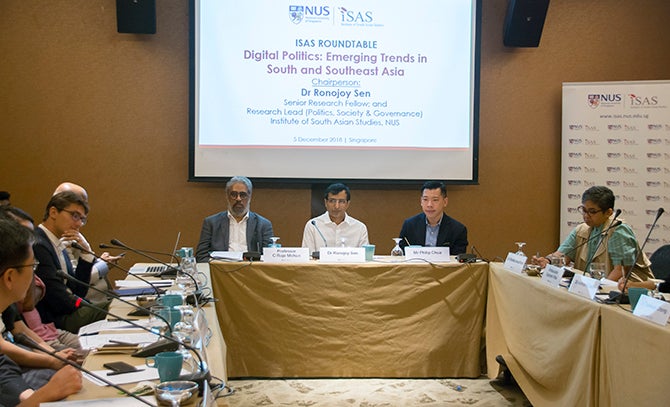
| Event Title: | ISAS Roundtable |
| Topic: | Digital Politics: Emerging Trends in South and Southeast Asia |
| Date/Time: | 05 December 2018 | 10:00 - 12:30 |
| Venue: | Dalvey Room, Level 2, NUSS Guild House, 9 Kent Ridge Drive, Singapore 119241 |
| Speaker/s: | Multiple Speakers |
| Chairperson: | Dr Ronojoy Sen |
| Description: | ISAS organised a roundtable on ‘Digital Politics: Emerging Trends in South and Southeast Asia’ on 5 December 2018 at the NUSS Guild House. The roundtable saw 21 distinguished guests share their views about recent events and key topics in the field of digital politics. The opening address was given by Philip Chua, Global Lead for Government and Elections at Twitter. He said that any mistruths circulated online would beg the question on citizen media literacy. He also highlighted the importance of focussing less on the content being circulated online. Rather, he suggested looking into how information is disseminated and how individuals behave online. This theme of targeting behaviour rather than content underpinned the discussions that followed. Chua concluded with an open-ended statement on the trade-off between having open conversations online and not curbing the freedom of expression. The roundtable began by noting the recent International Grand Committee meeting in the UK on fake news and disinformation, and its implication on Singapore’s deliberations on the issue. Subsequently, the importance of viewing technology as an enabler and as a solution was highlighted. Questions on whether there were any new artificial intelligence or machine learning techniques that could help address content and identify bad actors were raised, as was the issue of how other mediums of social media, such as images, videos and memes, could be regulated. On legislation, the participants emphasised that there could be no single actor serving as an arbiter of truth but rather a multitude of credible actors was necessary. They raised the issue of the impact of legislation on creativity due to the lack of resources to ensure accuracy. This extended to concerns about small media platforms and their future potential. The speakers dwelt on the importance of ensuring democracy despite regulation. There were fears of using regulation for political purposes and apprehensions on the lack of a level playing field for women and marginalised groups to express their opinions. This brought up the question of whether specific or broad laws would be more useful in encouraging self-censorship. The session concluded by reiterating the broader theme of constant evolution in this field and the importance of recognising that regulations operate differently in different ecosystems. |


